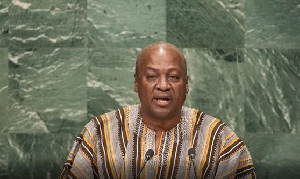What Africa needs is not development assistance from developed countries but “a fair chance” to trade with the rest of the world, the President of Ghana today told the United Nations General Assembly.
“Africa does not need your sympathy or overseas development assistance,” said President John Dramani Mahama during the general debate. “Africa needs a fair chance to trade with the rest of the world and amongst ourselves. The progress towards the creation of a Continental Free Trade Area (CFTA) is commendable and must be fast-tracked.”
He said that raising intra-African trade alone from the paltry average of 15 per cent will create better opportunities for Africa’s youth.
Recently he took the decision to allow citizens of other African countries travelling to Ghana to obtain visas on arrival. This would stimulate trade and investment if it were replicated across the continent, he explained.
He said that Africa is a continent of 54 countries at different stages of progress and development, and has the potential to be the next continent on the rise. Democracy is not a one size fits all system.
“The mistake with Africa is that we are seen as a homogenous unit and treated as such, not taking cognizance that we are a whole continent with different aspirations, cultures, democracies and economic development,” he said.
Ghana is a part of Africa’s success story as the “model of democracy” or the “beacon of democracy” in the region, the President said, explaining that since the adoption of the 1992 Constitution, successive elections – with power occasionally swinging between opposing political forces – has established Ghana’s democratic credentials in the world.
A strict two-term limit for the President means that every eight years it is guaranteed that there would be a new person in charge, and Ghana has a fiercely independent media with hundreds of newspapers and radio stations, he added.
The people of Ghana will go to the polls this December and the processes before, during and after will mark a further consolidation of Ghana’s credentials as a leading world democracy, he said.
Ghana’s economy, in terms of gross domestic product (GDP), has been chugging along at a pace of about six per cent over the last decade. With the structural reforms undertaken in collaboration with partners, and new developments in offshore oil and gas prospects, Ghana is looking at a respectable eight per cent annual GDP growth from next year.
As for the implementation of the Sustainable Development Goals (SDGs), he said that Ghana has begun its work on the targets in earnest, and has put into place the necessary national structures to ensure that the policies and measures taken fall in line with the 40-year development plan the country is currently formulating.
The President said he has also signed the ratification instrument of the Paris Agreement on climate change, and would be part of the event today to deposit Ghana’s instrument with the UN.
While Africa accounts for close to one third of the UN membership and nearly two-thirds of the work of the UN Security Council, “it remains woefully under-represented in the permanent and non-permanent category” of the Council, he said, calling for an equitable reform.
General News of Wednesday, 21 September 2016
Source: kasapafmonline.com

















